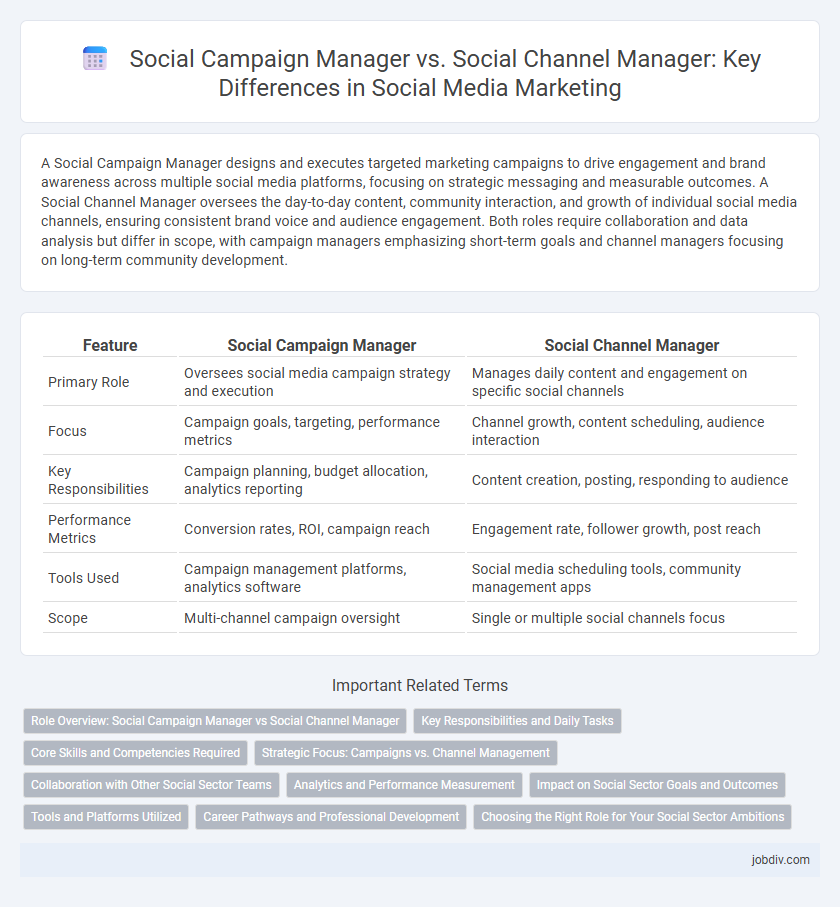A Social Campaign Manager designs and executes targeted marketing campaigns to drive engagement and brand awareness across multiple social media platforms, focusing on strategic messaging and measurable outcomes. A Social Channel Manager oversees the day-to-day content, community interaction, and growth of individual social media channels, ensuring consistent brand voice and audience engagement. Both roles require collaboration and data analysis but differ in scope, with campaign managers emphasizing short-term goals and channel managers focusing on long-term community development.
Table of Comparison
| Feature | Social Campaign Manager | Social Channel Manager |
|---|---|---|
| Primary Role | Oversees social media campaign strategy and execution | Manages daily content and engagement on specific social channels |
| Focus | Campaign goals, targeting, performance metrics | Channel growth, content scheduling, audience interaction |
| Key Responsibilities | Campaign planning, budget allocation, analytics reporting | Content creation, posting, responding to audience |
| Performance Metrics | Conversion rates, ROI, campaign reach | Engagement rate, follower growth, post reach |
| Tools Used | Campaign management platforms, analytics software | Social media scheduling tools, community management apps |
| Scope | Multi-channel campaign oversight | Single or multiple social channels focus |
Role Overview: Social Campaign Manager vs Social Channel Manager
A Social Campaign Manager focuses on planning, executing, and analyzing targeted marketing campaigns across various social media platforms to drive engagement and conversions. A Social Channel Manager oversees the daily management, content strategy, and community interaction specific to one or more social media channels, ensuring brand consistency and audience growth. Both roles require expertise in social media analytics, but Campaign Managers prioritize campaign performance metrics while Channel Managers emphasize ongoing audience engagement and channel-specific optimization.
Key Responsibilities and Daily Tasks
A Social Campaign Manager primarily focuses on designing, executing, and analyzing strategic marketing campaigns across various social media platforms to increase engagement and drive conversions. Key responsibilities include setting campaign goals, managing budgets, coordinating with creative teams, and monitoring performance metrics such as reach, impressions, and ROI. In contrast, a Social Channel Manager handles the day-to-day management of specific social media channels by curating content, engaging with audiences, scheduling posts, and maintaining brand voice consistency across platforms like Facebook, Instagram, and LinkedIn.
Core Skills and Competencies Required
A Social Campaign Manager requires expertise in strategic planning, data analytics, and multi-channel campaign execution to drive engagement and measure ROI effectively. Core competencies include project management, budget oversight, and proficiency in A/B testing for optimization. A Social Channel Manager focuses on content creation, community engagement, and platform-specific analytics, emphasizing skills in audience insights, real-time communication, and social media trends monitoring.
Strategic Focus: Campaigns vs. Channel Management
Social Campaign Managers specialize in designing and executing targeted marketing initiatives that drive specific objectives such as brand awareness, lead generation, or sales conversion. Social Channel Managers concentrate on maintaining and growing the presence of social media platforms by managing content calendars, community engagement, and channel performance optimization. The strategic focus of Campaign Managers revolves around short-term, goal-specific campaigns, whereas Channel Managers prioritize long-term brand consistency and audience relationship building across social networks.
Collaboration with Other Social Sector Teams
Social Campaign Managers coordinate with content creators, analytics teams, and paid advertising specialists to design and execute integrated marketing campaigns across multiple platforms. Social Channel Managers collaborate closely with community managers, customer support, and brand managers to ensure consistent messaging, audience engagement, and real-time response on specific social media channels. Both roles require seamless teamwork with various social sector teams to align strategic goals and maximize campaign effectiveness.
Analytics and Performance Measurement
A Social Campaign Manager specializes in tracking campaign-specific KPIs such as click-through rates, conversion rates, and ROI, using analytics tools to optimize ad spend and audience targeting. In contrast, a Social Channel Manager focuses on the overall performance metrics of individual social media platforms, including engagement rates, follower growth, and content reach. Both roles rely heavily on data-driven insights but differ in scope, with campaign managers emphasizing short-term campaign effectiveness and channel managers prioritizing long-term audience development and channel health.
Impact on Social Sector Goals and Outcomes
Social Campaign Managers drive targeted initiatives that amplify awareness and engagement, directly influencing measurable outcomes like donation increases and volunteer sign-ups. Social Channel Managers maintain and optimize platforms, ensuring consistent messaging and community growth to sustain long-term supporter relationships. Combining both roles enhances strategic impact, accelerating progress toward social sector goals through coordinated outreach and platform-specific engagement.
Tools and Platforms Utilized
A Social Campaign Manager primarily utilizes platforms like Google Ads, Facebook Ads Manager, and HubSpot to design, execute, and analyze targeted advertising campaigns. Social Channel Managers focus on tools such as Hootsuite, Sprout Social, and Buffer to schedule content, engage with followers, and monitor social media channels. Both roles leverage analytics tools like Google Analytics and native platform insights to measure performance and optimize strategies.
Career Pathways and Professional Development
Social Campaign Managers specialize in strategizing and executing targeted marketing initiatives across multiple platforms, enhancing skills in data analytics, project management, and advertising techniques. Social Channel Managers concentrate on curating content, community engagement, and platform-specific growth, developing expertise in audience insights, content strategy, and platform algorithms. Career pathways for Social Campaign Managers often lead to roles in marketing direction or digital strategy consulting, while Social Channel Managers can progress toward social media management or brand strategy leadership positions.
Choosing the Right Role for Your Social Sector Ambitions
Choosing between a Social Campaign Manager and a Social Channel Manager depends on your specific goals within the social sector. A Social Campaign Manager excels at designing and executing targeted initiatives that drive engagement and measurable social impact across diverse platforms. In contrast, a Social Channel Manager focuses on optimizing daily content, community interaction, and platform growth to maintain consistent audience relationships and enhance brand presence.
Social Campaign Manager vs Social Channel Manager Infographic

 jobdiv.com
jobdiv.com